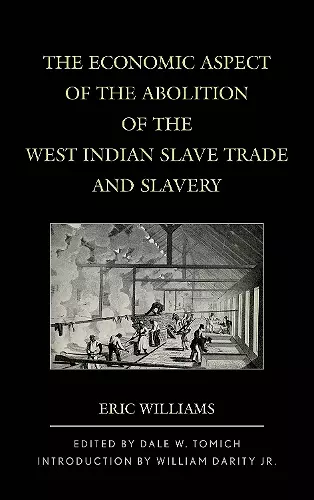The Economic Aspect of the Abolition of the West Indian Slave Trade and Slavery
Eric Williams author Dale W Tomich editor William Darity, Jr editor
Format:Paperback
Publisher:Rowman & Littlefield
Published:19th Aug '20
Currently unavailable, and unfortunately no date known when it will be back
This paperback is available in another edition too:
- Hardback£105.00(9781442231399)

In his influential and widely debated Capitalism and Slavery, Eric Williams examined the relation of capitalism and slavery in the British West Indies. Binding an economic view of history with strong moral argument, his study of the role of slavery in financing the Industrial Revolution refuted traditional ideas of economic and moral progress and firmly established the centrality of the African slave trade in European economic development. He also showed that mature industrial capitalism in turn helped destroy the slave system. Establishing the exploitation of commercial capitalism and its link to racial attitudes, Williams employed a historicist vision that has set the tone for an entire field. Williams’s profound critique became the foundation for studies of imperialism and economic development and has been widely debated since the book’s initial publication in 1944. The Economic Aspect of the Abolition of the West Indian Slave Trade and Slavery now makes available in book form for the first time his dissertation, on which Capitalism and Slavery was based. The significant differences between his two works allow us to rethink questions that were considered resolved and to develop fresh problems and hypotheses. It offers the possibility of a much deeper reconsideration of issues that have lost none of their urgency—indeed, whose importance has increased.
The fact that Williams’s previously hard to access doctoral thesis is now available to the general public will help to clarify important aspects of the ‘Williams Thesis’ and its genesis. . . . The route from dissertation to final text runs parallel to Williams’s trajectory from a young black student combating racism and imperial narratives at Oxford to the future prime minister of an independent nation. Apart from being an important historiographical document, Williams’s dissertation is therefore also a historical source in its own right. . . . [R]econsidering the ‘making of’ the Williams Thesis can have a profound impact on how we view its later interpretations and current relevance. . . . The Economic Aspect provides important insights into the genealogy of the Williams Thesis that are much harder to grasp from the more polemical, and more layered text of Capitalism and Slavery. . . . The publication of The Economic Aspect finally makes it possible for a wider audience to retrace Williams’s steps. In the process, we can start to disentangle Williams’s complicated relationship to the Oxford imperial historians, radical predecessors and contemporaries, and the emerging anti-colonial struggles of his day. * International Review Of Social History *
Here readers will find the original formulation of some of the ideas that led to Eric Williams’s long-famous Capitalism and Slavery, which addressed, among a wide range of provocative issues, why Britain abolished the slave trade and slavery within its empire during the early years of the nineteenth century largely for strong economic rather than humanitarian reasons, though both sources of motivation carried weight. This new book shows the dissertation as a separate, if closely related, intellectual project of great insight. The published dissertation will surely awaken new interest in Williams's ideas that have sparked so much heated debate in their continued global relevance to issues related to capitalism, power, poverty, and much more. -- David Barry Gaspar, Duke University
A major publishing event for scholars and students of slavery, abolition, capitalism, and the Atlantic world. The appearance of Eric Williams's thesis will mark a turning point in the historical debates that his work has long fueled. -- Christopher Schmidt-Nowara, Tufts University
ISBN: 9781538147085
Dimensions: 221mm x 153mm x 20mm
Weight: 413g
278 pages